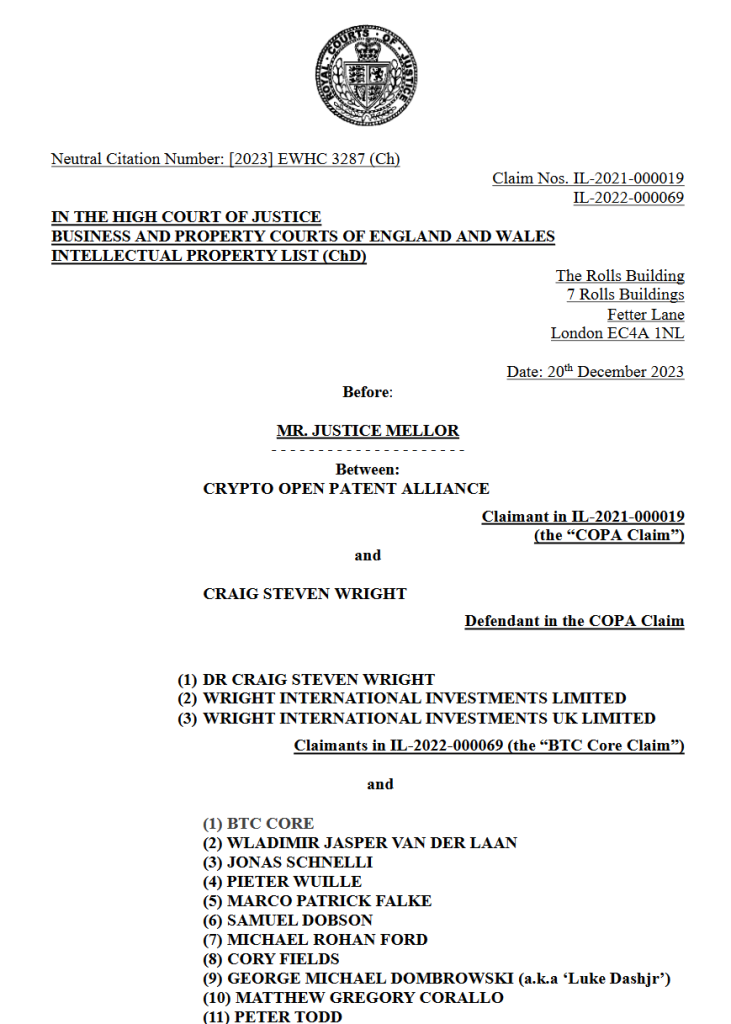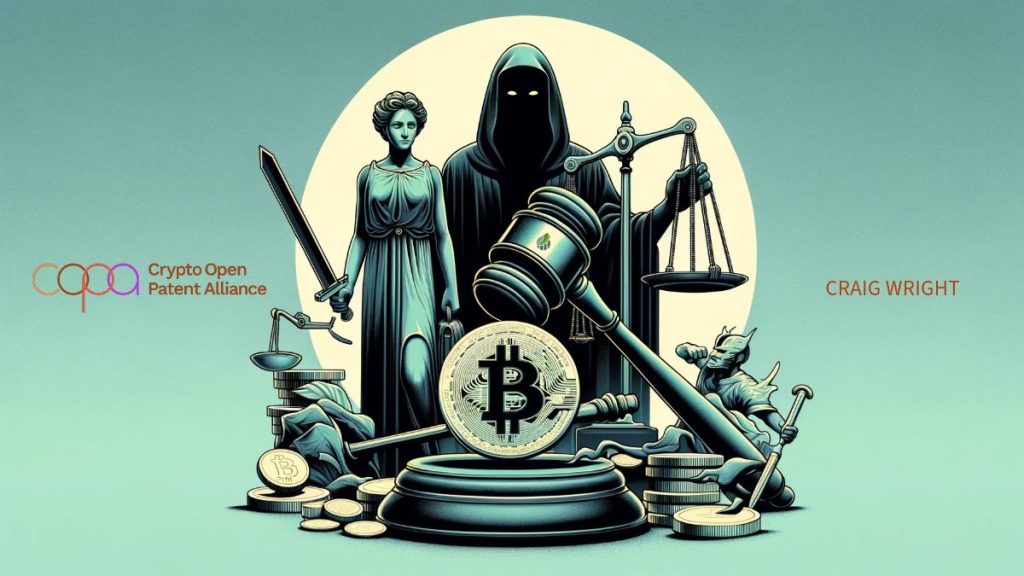The judgment from the pre-trial review (PTR) on December 15, 2023, in the case involving the Crypto Open Patent Alliance (COPA) and Dr. Craig Wright, revolves around the pivotal ‘Identity Issue’ of whether Dr. Wright is indeed Satoshi Nakamoto, the pseudonymous individual credited with creating Bitcoin. The judgment, delivered by Mr Justice Mellor, addresses several key applications and sets the stage for the trial proceedings.
In Simple Terms
Let’s break down the key points and explain what this means in simpler terms:
- Pre-Trial Review (PTR): This is a meeting before the actual trial starts. It’s like a planning session where the judge decides how the trial will proceed. This particular PTR took a full day, and the judge announced some decisions at the end but promised to explain them in more detail later, which is what this document does.
- The Main Issue: The big question in this trial is whether Dr. Craig Wright is actually Satoshi Nakamoto, the mysterious person (or group of people) who created Bitcoin. This is referred to as the ‘Identity Issue’.
- What’s Being Argued: The judge had to make decisions about two main things: whether Dr. Wright could bring in some new documents as evidence (‘Additional Documents’), and whether the trial should be delayed (‘adjourn the trial’).
- Background of the Case: COPA filed a claim against Dr. Wright in April 2021, basically saying they don’t believe he is Satoshi Nakamoto. Dr. Wright and his companies filed a counterclaim in July 2022. There are actually four related cases all being managed together because they involve similar issues.
- What’s Happened So Far: Both sides have been sharing information and evidence since the cases started. Dr. Wright listed documents he wanted to use to prove he is Satoshi, and COPA challenged the authenticity of some of those documents. An expert report on these documents is quite substantial, indicating the complexity of the evidence.
- The New Documents: Dr. Wright found 97 new documents he wants to use in the trial. He claims he found them on two USB drives in his house. There’s a bit of a fight over whether he can use these documents and under what conditions, especially because there’s some question about their authenticity.
- Legal Principles at Play: The judge must balance several factors, such as ensuring a fair trial, keeping costs reasonable, and dealing with the case efficiently. The decision to delay a trial or allow new evidence often comes down to whether it’s necessary for a fair trial.
In essence, this judgment addresses procedural steps in a high-profile legal battle over the true identity of Satoshi Nakamoto. It’s not about deciding the truth of the matter but about setting the rules for how the trial will proceed.

The Legal Details
- Principal Applications: The main applications were Dr. Wright’s request to rely on additional documents discovered and his request to adjourn the trial scheduled for January 15, 2024. The additional documents were categorized into three groups: 97 documents from USB drives allegedly found by Dr. Wright, certain LaTeX documents from his Overleaf account, and the Documentary Credits Assignment Documents.
- Extended Disclosure: Both parties have provided further disclosure at various points since the Case Management Conference (CMC) on September 1-2, 2022. Notably, Dr Wright disclosed a list of documents he primarily relies on to establish his claim to be Satoshi Nakamoto, and COPA produced a list of documents challenging their authenticity.
- Expert Evidence: There has been an exchange of expert evidence from both sides, including forensic document analysis and autism spectrum disorder (ASD), which may play a role in the trial.
- The Additional Documents: The judgment goes into detail about the recently discovered documents that Dr. Wright wishes to introduce. There is contention over the authenticity and relevance of these documents, with expert witnesses providing conflicting reports on whether the metadata and content have been manipulated.
- Pre-Trial Requests and Proposals: The judge made requests for both parties to propose practical limitations on their cases to maintain the original trial date. COPA was willing to focus on 20 primary allegations of forgery, whereas Dr Wright’s team highlighted the importance of all documents, asserting that a selection of ‘the most important’ documents would not impact the scope of issues to be considered at trial.
- Fairness of the Trial: The judgment emphasizes the importance of fairness in the trial, considering whether it’s feasible to set a revised timetable for all parties to be adequately prepared.
- Confidentiality Concerns: There is a dispute over the terms regarding the confidentiality of the LaTeX documents, as well as the integrity and provenance of the new evidence presented by Dr. Wright.
- Costs and Further Directions: There are also considerations for the costs associated with the ASD issue and other procedural matters leading up to the trial.
COPA Granted Permission to Plead Forgery in Case Against Wright
The Cryptocurrency Open Patent Alliance (COPA) has been granted the green light to pursue additional forgery allegations against Dr. Wright. On October 12, 2023, a hearing concluded with a judgment allowing COPA to expand its case with a focus on the authenticity of documents presented by Dr. Wright.
The judgment, reserved on October 24 and formalized in an Order dated October 31, 2023, references the case number [2023] EWHC 2642 (Ch) and marks a pivotal moment in the ongoing legal battle over the legitimacy of claims to critical aspects of Bitcoin technology. COPA’s allegations stem from a list of documents that Dr. Wright had previously disclosed, known as the list of Challenged Documents, which were served on May 5, 2023.
The permission to plead forgery, although limited to 50 specific instances, opens a new chapter in the scrutiny of Dr. Wright’s claims. The case, already steeped in controversy, promises to delve deeper into technical evidence and expert testimony to ascertain the truthfulness of the challenged documents. The outcome of these allegations could have a profound impact on the credibility of the parties involved and could set legal precedents affecting patent rights and the ownership of cryptocurrency-related intellectual property.
The judgment meticulously outlines the procedural history leading up to this point, the complexities introduced by the new evidence, and the considerations required to ensure a fair and just trial under the overarching principles of court conduct.
The decision to adjourn and the permission to introduce new evidence hinge on balancing the right to a fair trial against procedural efficiency and the integrity of the evidence. The trial’s outcome will likely have significant implications for the parties involved and potentially for the wider cryptocurrency community.
Joint Trial
Legal disputes around crypto are becoming as complex as the technology itself. A recent document released about the Joint Trial involving a COPA Claim and a BTC Core Claim illustrates this complexity. Craig Wright, Wright International Investments Ltd, and Wright International Investments UK Ltd are collectively referred to as “the Claimants” in this high-profile case. This designation indicates a consolidated front for the parties claiming rights or disputing allegations related to Bitcoin (BTC) technology.
This joint trial is a beacon for the crypto community as it may set precedents for how blockchain-related cases are handled in the future. The outcomes could have significant implications for developers, investors, and users in the decentralized finance (DeFi) space. The trial also serves as a reminder that as much as blockchain thrives on decentralization and autonomy, the legal framework surrounding it is still very much centralized and bound by jurisdictional precedents.
The integration of blockchain-related cases into the traditional legal system raises questions about jurisdiction, the recognition of digital assets as property, and the application of existing laws to new technology. The document suggests that the parties may rely on any documents disclosed in the COPA Claim, indicating a reliance on transparency and documentation in a space often criticized for its opacity.
As the COPA trial progresses, it will be critical to monitor the arguments presented, the evidence relied upon, and the eventual outcomes. The crypto world watches with bated breath as the intersection of old-world legal systems meets the new-world technology of blockchain. Whatever the verdict, the ramifications will ripple through the crypto markets and beyond.
Author Profile

- Lucy Walker covers finance, health and beauty since 2014. She has been writing for various online publications.
Latest entries
- June 30, 2025NewsWireBank Savings at Risk: The Dark Side of EU’s Savings Standard
- April 25, 2025Global EconomicsWhistleblowers Unmask Schwab’s Toxic WEF Secrets
- April 9, 2025Global EconomicsTariff Tensions Drive Market Volatility
- March 18, 2025Global EconomicsRed in Name Only: Labour’s War on the UK Working Class




